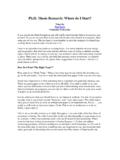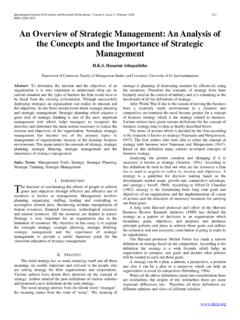Transcription of Integrating Disability, Transforming Feminist Theory
1 Integrating disability , Transforming Feminist TheoryAuthor(s): Rosemarie Garland-ThomsonReviewed work(s):Source: NWSA Journal, Vol. 14, No. 3, Feminist disability Studies (Autumn, 2002), pp. 1-32 Published by: The Johns Hopkins University PressStable URL: .Accessed: 25/02/2013 15:58 Your use of the JSTOR archive indicates your acceptance of the Terms & Conditions of Use, available at ..JSTOR is a not-for-profit service that helps scholars, researchers, and students discover, use, and build upon a wide range ofcontent in a trusted digital archive. We use information technology and tools to increase productivity and facilitate new formsof scholarship. For more information about JSTOR, please contact .The Johns Hopkins University Press is collaborating with JSTOR to digitize, preserve and extend access toNWSA This content downloaded on Mon, 25 Feb 2013 15:58:30 PMAll use subject to JSTOR Terms and ConditionsIntegrating disability , Transforming Feminist Theory ROSEMARIE GARLAND-THOMSON This essay aims to amplify Feminist Theory by articulating and foster- ing Feminist disability Theory .
2 It names Feminist disability studies as an academic field of inquiry, describes work that is already underway, calls for needed study and sets an agenda for future work in Feminist disabil- ity studies. Feminist disability Theory augments the terms and confronts the limits of the ways we understand human diversity, the materiality of the body, multiculturalism, and the social formations that interpret bodily differences. The essay asserts that Integrating disability as a cat- egory of analysis and a system of representation deepens, expands, and challenges Feminist Theory . To elaborate on these premises, the essay discusses four fundamental and interpenetrating domains of Feminist Theory : representation, the body, identity, and activism, suggesting some critical inquiries that considering disability can generate within these theoretical arenas. Keywords: aesthetic surgery / body / conjoined twins / disability studies!
3 Fashion models / Feminist studies / identity / intersexuality / queer Theory Over the last several years, disability studies has moved out of the applied fields of medicine, social work, and rehabilitation to become a vibrant new field of inquiry within the critical genre of identity studies. Charged with the residual fervor of the Civil Rights Movement, Women's Studies and race studies established a model in the academy for identity-based critical enterprises that followed, such as gender studies, queer studies, disability studies, and a proliferation of ethnic studies, all of which have enriched and complicated our understandings of social justice, subject formation, subjugated knowledges, and collective action. Even though disability studies is now flourishing in disciplines such as history, literature, religion, theater, and philosophy in precisely the same way Feminist studies did twenty-five years ago, many of its practitioners do not recognize that disability studies is part of this larger undertaking that can be called identity studies.
4 Indeed, I must wearily conclude that much of current disability studies does a great deal of wheel reinventing. This is largely because many disability studies scholars simply do not know either Feminist Theory or the institutional history of Women's Stud- ies. All too often, the pronouncements in disability studies of what we need to start addressing are precisely issues that Feminist Theory has been grappling with for years. This is not to say that Feminist Theory can be ?2002 NWSA JOURNAL, VOL. 14 No. 3 (FALL) This content downloaded on Mon, 25 Feb 2013 15:58:30 PMAll use subject to JSTOR Terms and Conditions2 ROSEMARIE GARLAND-THOMSON transferred wholly and intact over to the study of disability studies, but it is to suggest that Feminist Theory can offer profound insights, methods, and perspectives that would deepen disability studies. Conversely, Feminist theories all too often do not recognize disabil- ity in their litanies of identities that inflect the category of woman.
5 Repeatedly, Feminist issues that are intricately entangled with disabil- ity-such as reproductive technology, the place of bodily differences, the particularities of oppression, the ethics of care, the construction of the subject-are discussed without any reference to disability . Like disabil- ity studies practitioners who are unaware of feminism, Feminist scholars are often simply unacquainted with disability studies' perspectives. The most sophisticated and nuanced analyses of disability , in my view, come from scholars conversant with Feminist Theory . And the most compelling and complex analyses of gender intersectionality take into consideration what I call the ability/ disability system-along with race, ethnicity, sexuality, and class. I want to give the omissions I am describing here the most generous interpretation I can. The archive, Foucault has shown us, determines what we can know. There has been no archive, no template for under- standing disability as a category of analysis and knowledge, as a cultural trope, and an historical community.
6 So just as the now widely recognized centrality of gender and race analyses to all knowledge was unthinkable thirty years ago, disability is still not an icon on many critical desktops. I think, however, that Feminist Theory 's omission of disability differs from disability studies' ignorance of Feminist Theory . I find Feminist Theory and those familiar with it quick to grasp the broad outlines of disability Theory and eager to consider its implications. This, of course, is because Feminist Theory itself has undertaken internal critiques and proved to be porous and flexible. disability studies is news, but Feminist Theory is not. Nevertheless, Feminist Theory is still resisted for exactly the same reasons that scholars might resist disability studies: the assumption that it is narrow, particular, and has little to do with the mainstream of academic practice and knowledge (or with themselves). This reductive notion that identity studies are intellectual ghettos limited to a narrow constituency demanding special pleading is the persistent obstacle that both Feminist Theory and disability studies must surmount.
7 disability studies can benefit from Feminist Theory and Feminist Theory can benefit from disability studies. Both feminism and disability studies are comparative and concurrent academic enterprises. Just as feminism has expanded the lexicon of what we imagine as womanly, has sought to understand and destigmatize what we call the subject posi- tion of woman, so has disability studies examined the identity disabled in the service of Integrating people with disabilities more fully into our society. As such, both are insurgencies that are becoming institutional- This content downloaded on Mon, 25 Feb 2013 15:58:30 PMAll use subject to JSTOR Terms and ConditionsINTEGRATING disability , Transforming Feminist Theory 3 ized, underpinning inquiries outside and inside the academy. A Feminist disability Theory builds on the strengths of both. Feminist disability Theory My title here, " Integrating disability , Transforming Feminist Theory ," invokes and links two notions, integration and transformation, both of which are fundamental to the Feminist project and to the larger Civil Rights Movement that informed it.
8 Integration suggests achieving parity by fully including that which has been excluded and subordinated. Trans- formation suggests re-imagining established knowledge and the order of things. By alluding to integration and transformation, I set my own modest project of Integrating disability into Feminist Theory in the politi- cized context of the Civil Rights Movement in order to gesture toward the explicit relation that feminism supposes between intellectual work and a commitment to creating a more just, equitable, and integrated society. This essay aims to amplify Feminist Theory by articulating and foster- ing Feminist disability Theory . In naming Feminist disability studies here as an academic field of inquiry, I am sometimes describing work that is already underway, some of which explicitly addresses disability and some of which gestures implicitly to the topic. At other times, I am calling for study that needs to be done to better illuminate Feminist thought.
9 In other words, this essay, in part, sets an agenda for future work in femi- nist disability Theory . Most fundamentally, though, the goal of Feminist disability studies, as I lay it out in this essay, is to augment the terms and confront the limits of the ways we understand human diversity, the materiality of the body, multiculturalism, and the social formations that interpret bodily differences. The fundamental point I will make here is that Integrating disability as a category of analysis and a system of repre- sentation deepens, expands, and challenges Feminist Theory . Academic feminism is a complex and contradictory matrix of theories, strategies, pedagogies, and practices. One way to think about Feminist Theory is to say that it investigates how culture saturates the particu- larities of bodies with meanings and probes the consequences of those meanings. Feminist Theory is a collaborative, interdisciplinary inquiry and a self-conscious cultural critique that interrogates how subjects are multiply interpellated: in other words, how the representational systems of gender, race, ethnicity, ability, sexuality, and class mutually construct, inflect, and contradict one another.
10 These systems intersect to produce and sustain ascribed, achieved, and acquired identities-both those that claim us and those that we claim for ourselves. A Feminist disability Theory introduces the ability/ disability system as a category of analysis This content downloaded on Mon, 25 Feb 2013 15:58:30 PMAll use subject to JSTOR Terms and Conditions4 ROSEMARIE GARLAND-THOMSON into this diverse and diffuse enterprise. It aims to extend current notions of cultural diversity and to more fully integrate the academy and the larger world it helps shape. A Feminist disability approach fosters complex understandings of the cultural history of the body. By considering the ability/ disability system, Feminist disability Theory goes beyond explicit disability topics such as illness, health, beauty, genetics, eugenics, aging, reproductive technolo- gies, prosthetics, and access issues. Feminist disability Theory addresses such broad Feminist concerns as the unity of the category woman, the status of the lived body, the politics of appearance, the medicalization of the body, the privilege of normalcy, multiculturalism, sexuality, the social construction of identity, and the commitment to integration.




